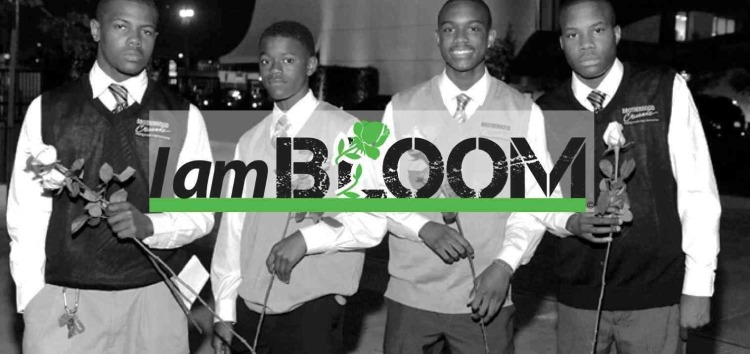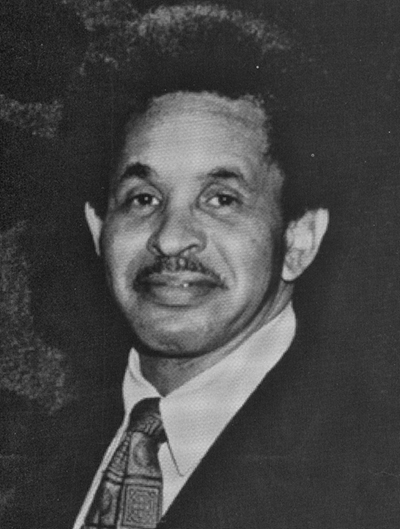
Good Morning POU!
Today we feature an organization that has been around for more than four decades. Founded by a 33 yr old in the Watts community of Los Angeles in 1968 and still going strong today, The Brotherhood Crusade continues to make a difference in the lives of many.
Walter Bremond founded the Brotherhood Crusade in 1968, and co-founded the National Black United Fund (NBUF) in 1972.
A native of Austin, Tex., Walter Bremond earned a Bachelor of Arts degree and a Master of Science degree from San Francisco State College and became active in the black community of Los Angeles. He was the organizing chairman of the Los Angeles Black Congress in 1962, and in 1968, after the Watts riots, he founded the Los Angeles Brotherhood Crusade.
After the 1965 Watts Revolt, Bremond, then only 30 yrs old, and a distinguished group of Black social activists got together and hammered out what became the largest and most successful Black independent funding source in the nation, and gave life to an ancient idea in the Black community–the Brotherhood Crusade. He followed that model by co-founding the National Black United Fund that spawned similar funding organizations throughout the country. In co-founding the Black United Fund, his vision was to establish a co-coordinating and planning body, on the national level, to assist in the creation, training and maintenance of competent staffs, and in the other activities designed to further the concept and practice of self-help.
In 1972, leaders of the Brotherhood Crusade recognized the need for a national organization that could lead to the establishment of a network of efforts around the country. NBUF was incorporated that same year, and with grant support from the Cummins Engine Foundation, immediately established affiliate organizations in Detroit, Boston, Los Angeles and Fort Worth.
During the 1970s the local affiliates raised money for Black Americans, fulfilling NBUF’s philosophy of self-sufficiency and self-help for the Black American community. NBUF filled a major gap left by traditional mainstream funding sources which invested less than 2% of their resources with organizations led by Black Americans.
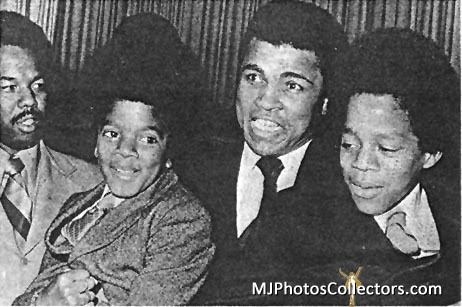
1971 – The Jackson 5 attend the Salute to Muhammad Ali charity held at Hollywood Palladium, to raise money for the Los Angeles Brotherhood Crusade.
In its initial stage of development, NBUF relied primarily on foundation support and payroll deduction as a means to support the work of the organization.
At the time, accessing workplace giving was an appropriate strategy since most Black American income came from salaries. NBUF recognized that the Combined Federal Campaign (CFC), which accessed potential Black American contributors, could provide a stable and reliable source of revenue for the organization and the work of its affiliates. NBUF was denied entrance to the CFC campaign twice.
A landmark Legal Victory: Opening the Market
In 1976, NBUF legally challenged the CFC based on the premise that the United Way’s sole access to the CFC did not provide fair and equitable access to all similarly situated organizations. In 1980, NBUF secured the legal right to enter the CFC campaign. This breakthrough allowed a myriad of ethnic and other “alternative” charitable organizations to benefit. With this step, NBUF positioned itself as a major catalyst and anchor in the movement to diversify philanthropy and charitable giving.
For Mr. Bremond, the fund stood for his belief that blacks ”had a responsibility to assist in our own growth and development, that we could not forever go to the larger white community and ask for support of programs we believe are important for our survival without doing something ourselves.”
Walter Bremond died in 1982. Currently the organization is led by his daughter Charisse.
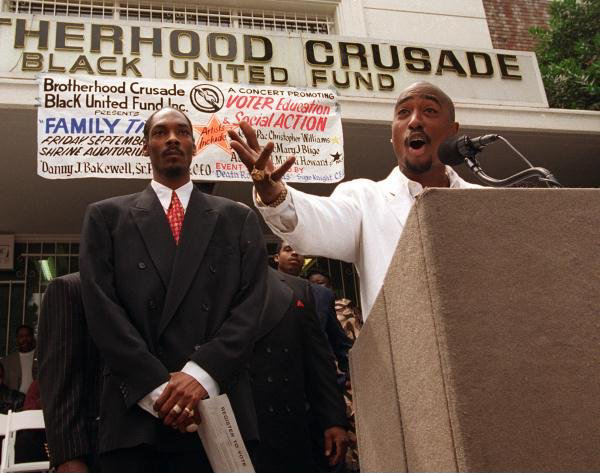
1995 – Tupac speaks before Thanksgiving rally to fundraise for the Brotherhood Crusade
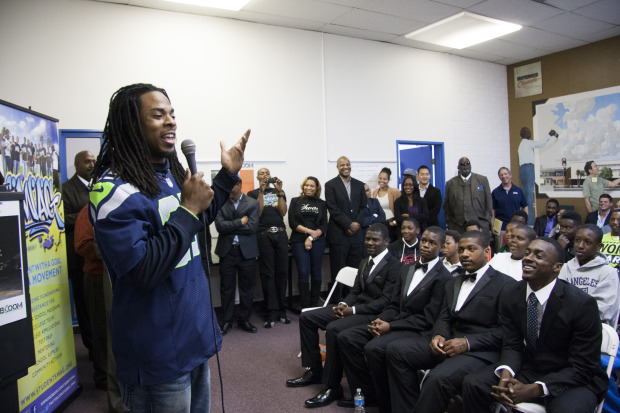
2013 – Richard Sherman promotes S.W.A.G. (Students With A Goal), an affiliate of The Brotherhood Crusade
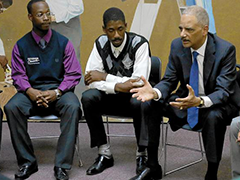
2014 – U.S. Attorney General Eric Holder stopped in to meet with young men part of the City of Los Angeles YouthSource program at the YouthSource Center operated by Brotherhood Crusade in the Crenshaw District. Holder and the youth discussed racial profiling and how to improve relationships between law enforcement and communities of color. The visit was part of Holder’s Smart on Crime initiative.
The following is from the Los Angeles Times, May 2015.
Program helps troubled, rejected youth make positive connections
It was a riot-zone image ripe with meaning: An angry black mother waded through rock-throwing kids in Baltimore to collar her teenage son. Then, in a video that would become a viral sensation, she cursed him out and pummeled him for joining the lawless scrum..
She was just trying to keep the boy out of trouble, Toya Graham later explained — to national applause.
We’d like to believe all that requires is a dose of parental tough love, that angry, aimless teens can be set straight with a few whacks on the head.
But the problems of inner-city kids in Baltimore, and those in Los Angeles, can’t be solved by Super Moms — who often are scared and frustrated themselves.
Their neighborhoods are dangerous, their schools are bad and local jobs are scarce. Their sons, they know, have been written off as troublemakers and threats.
“A lot of our young people aren’t connected to anything except the guys in the streets,” said George Weaver of Los Angeles’ Brotherhood Crusade, which runs a program aimed at steering juvenile delinquents away from prison and toward success.
They are high school students who read so poorly that they struggle with a third-grade book. Most are being raised by single mothers, many have been in foster care and some are homeless. Only a few have ever held a job; some don’t know anyone who has.
They feel like the mainstream world has rejected them, so they turn their backs on it and embrace the ethos of the streets.

Semaj Clark with mentor Mykol Lewis on the Mt. San Antonio College campus
“Where I come from, it’s cool to steal or smoke or have all these girls,” said Semaj Clark, who joined the program — called BLOOM, or Building a Lifetime of Options and Opportunities for Men — two years ago, when he was 16. “That’s what you have to do to have somebody respect you. Even older people in the neighborhood will pat you on the back for doing something bad.”
Clark was born in a Watts housing project to a mother who was 17 and addicted to drugs.
He spent his childhood in a foster home, with a man so abusive that Clark’s body was marked with bruises. He began running away and hanging out with street-wise teens. Arrested at 12 for burglary, he spent years cycling in and out of detention centers for petty crimes.
His adolescent swagger masked hurt, fear and anger: “I felt abandoned and neglected, like nobody was there for me,” he said. “I’d see other people with families, and I’d get mad about that.”
When his probation officer sent him to the Brotherhood Crusade, Clark didn’t expect much. “I figured they were like everybody else, getting paid to act like they cared.”
Now the high school dropout is enrolled in Mt. San Antonio community college, working as a violence prevention counselor and taking classes at Cal Poly Pomona, where he lives in the dorms.
The journey wasn’t easy, said Clark’s Brotherhood Crusade counselor, Mykol Lewis. “He was like a yo-yo. He would do really well for a while, then get caught up in something negative and worry that we were going to judge him. We had to gain his trust. And he had to get over feeling ashamed and really believe that we saw greatness in him.”
That’s what the program calls a “strengths-based” approach, aimed at lifting up young men who’ve been told all their lives that they won’t amount to anything.
I asked Clark what mattered most in his campaign of hope and change: persistence, encouragement and opportunity, he said.
“There was this whole list of people who kept calling my home, wondering what I’m doing, am I OK, did I have money in my pocket, was I hungry, did I go to school today. Nobody had ever kept up with me like that,” he said.
He learned that a man must be accountable for his choices: “I tried their way, and I tried my way. My way didn’t always go the way I wanted,” he said. “When I made a wrong decision, I had to deal with the outcome.”
And he found better role models than the hustlers on his block: “They put you around successful black men that make you want to be that kind of person.”
The program, funded by the California Community Foundation, is part of a national initiative to help young black and Latino men stay out of trouble, succeed in school and build careers by connecting them with mentors, tutors, counselors and job training programs.
Public-private partnerships help but can’t solve fundamental problems. We need better schools, safer neighborhoods, help for struggling families and more accountability from police and politicians.
Those young men need more of us to show we care about them — and more encouragement to care about each other.
On the day I interviewed Clark, he was worried about his younger brother, who is still in foster care in South Los Angeles. That morning, Clark said, the boy had woken up to a gun in his face and to the shouts of police officers, who herded everyone outside and ordered them face-down on the ground. They were apparently conducting a raid, Clark said.
“They asked him where he’s from.” His voice tightened on the phrase gang members use to identify one another. “My little brother is 13. He’s never even stole a piece of candy from the store. … And he has to lie in the dirt like he’s done something wrong.”
I asked if he was angry, if that might tug him off track.
Clark said he was furious but had worked it out in his morning math class. “I thought about my little brother when I was taking my test,” he said. He aced that algebra exam.
“We have to face things in the inner city that other kids don’t have to worry about. But I can show him that I got 100% — so he can do that.”
2012- Lazarrius Taylor had been shot and arrested by the time he was 14 years old. Motivated by a desire to make his grandmother proud, and with the mentoring of The Brotherhood Crusade, Taylor now has a bright future.


